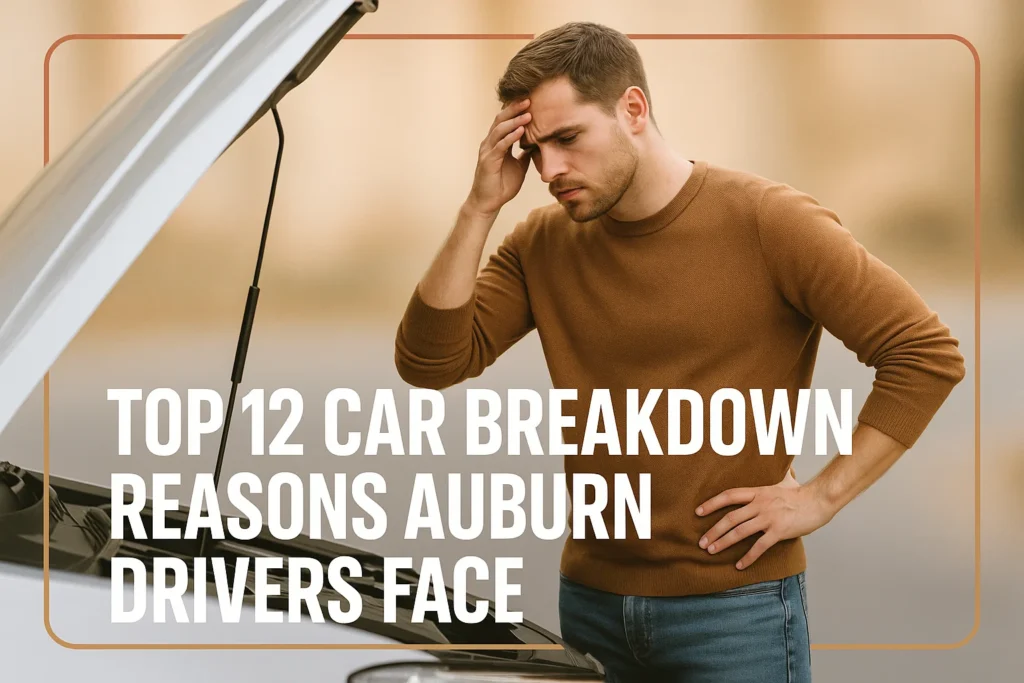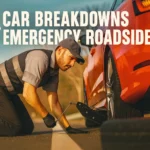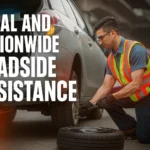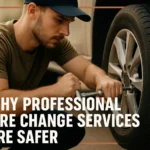It is easy to imagine driving to work or on a weekend outing and all of a sudden your vehicle stalls in Auburn. Panic strikes and your plans get postponed and the repair bills start flowing through the mind. The car may break down on anyone at any time and it is not only annoying it is also dangerous and costly. The great news is? The majority of breakdowns can be avoided knowing the warning signs and what usually causes them. Here, we will uncover the 12 most common causes of breakdown in your vehicles that Auburn drivers come across as well as provide useful tips you can use to maintain a smooth car operation
Common Causes That Lead to Car Breakdowns in Auburn
In Auburn, as in any other place, a car can have numerous problems that may result in a sudden breakdown. Whether it is because of mechanical wear and tear or even lack of proper routine maintenance these issues may not only come during the worst moments. These are underpowered batteries, flat tires, overheated engines, bad alternators and transmission problems. Breakdowns are also caused by factors like low fluids, ignition system issues and electrical failures among others. The awareness of these problems can aid drivers by alerting them to the possibility of adverse effects at an early stage, taking precautions and avoiding unnecessary cost in serious repairs or putting themselves and others at risk when driving. The easiest, most affordable means to ensure your vehicle remains reliable and runs smoother is to continue being proactive and collecting routine inspections, maintaining and repairing at the appropriate time in Auburn.
Top 12 Car Breakdown Reasons in Auburn
1. Dead or Weak Battery
Being one of the most common causes of breakdown, car battery failure can be attributed to a flat battery. Batteries could experience failures because of age, being left on all night, or even the weather which was extreme during the summers and winters in Auburn.
Signs of battery issues:
- Slow crank of engine on starting
- Dim headlights
- Warning light in the dashboard
Prevention tips:
- Periodically check your battery and especially when your battery is more than three years old.
- Watch terminals, keep them clean and free of corrosion.
- It helps not to leave electrical components turned on when the car is switched off.
2. Flat or Damaged Tires
Improperly maintained tires are subject to sudden flats or blowouts can occur if you are driving on them. The risk can rise because of potholes or debris on the Auburn roads.
Signs of tire problems:
- Asymmetrical tire wear
- Vibration while diving
- The Low tire pressure warning light
Prevention tips:
- Examine tires on a monthly basis looking at flaws, punctures or tread.
- Changing tires should be done once every 6000-8000 miles.
- Be sure to keep good tire pressure at your car manual suggests.
3. Engine Overheating
A hot engine will strand you and might incur serious damage especially when ignored. Reasons are low coolant, defective radiator or defective thermostat.
Signs of engine overheating:
- Temperature is getting into the red.
- Under-hood steam or smoke
- Abnormal odors such as burnt coolant
Prevention tips:
- Indicate the gauge of coolant.
- Replace belts and hoses to the recommended times.
- Under extreme heat, do not drive your car hard without breaks.
4. Faulty Alternator
Your car has an alternator that seeks to charge up the battery as the car runs. Otherwise, failure will lead to quick consumption of the battery stranding you.
Signs of alternator problems:
- Low lights or shimmering dash lights
- Queer whining sounds
- When your car stops going on the road
Prevention tips:
- A check sound is coming out of the engine bay.
- Check the belts that run the alternator.
- You should have your alternator checked whenever you have service checks.
5. Starter Motor Issues
The starter motor is the one to turn over the engine every time you start your car. Otherwise, the result is that your car will not start.
Signs of starter failure:
- Turning the key makes a clicking sound
- Frequent failure to start. Intermittent ignition faults
- No reaction of the ignition
Prevention tips:
- Avoid extreme turning of the inboard engine.
- Maintain electrical connections in a tight and corrosion-free condition.
- Change starter motors when a sign of trouble is seen.
6. Transmission Problems
The transmission failures may take time or may develop suddenly. Typical problems are skipped gears, possibly fluid leakage, or grinding sounds. This is a typical issue that Auburn drivers of older cars have to run into.
Signs of transmission trouble:
- Hard to change the gears
- Leaks of transmission fluid or an insufficient level of fluid
- Transmission fluid odor: Burning transmission fluid odor
Prevention tips:
- Have the transmission fluid changed at the scheduled time of your car manufacturer.
- There should not be aggressive driving and hard shifts.
- Have older cars inspected on a regular basis.
7. Fuel System Failures
Your car will not run smoothly because of a clogged or a bad fuel filter, a bad fuel pump or bad fuel.
Signs of fuel system issues:
- At high speeds, the engine would sputter.
- Difficulty in starting
- Loss of fuel efficiency
Prevention tips:
- Use high quality fuel.
- Change filters of fuels regularly.
- Avoid filling the car up on an empty fuel situation often.
8. Ignition System Problems
The ignition system provides the desired performance of your engine and enables it to start. Incorrect ignition coils and spark plugs as well as wiring may lead to breakdowns.
Signs of ignition issues:
- Engine stalls or stammers
- Poor acceleration
- Check engine coming on
Prevention tips:
- Change the spark plugs as suggested.
- Check the wire ignition and coil.
- On the ignition system, remove all moisture and keep it clean.
9. Brake Failures
Brake issues are not just an inconvenience- it is also unsafe. Problems such as worn pads, low brake fluid, or deformed rotors may result in loss of braking power all of a sudden.
Signs of brake issues:
- Squealing or grinding sounds
- Spongy or soft just brake pedal
- When braking the car pulls to one side of the road
Prevention tips:
- Check brakes 6 to 12 months.
- Change brake pads and fluid in time.
- Consider any unusual sound or sensation immediately.
10. Overdue Maintenance
Failure to carry out regular car maintenance is a silent killer to cars. Breakdowns can be prevented by repairing trivial problems such as worn belts, old fluids, dirty filters, etc.
Signs of maintenance neglect:
- Several warning lights on the dashboard
- Weird sounds or vibration
- Declined vehicle performance
Prevention tips:
- Use the maintenance schedule of your owner’s manual.
- Record every service you have done.
- Even small problems do not go ignored- they tend to be big repairs.
11. Electrical System Failures
The contemporary cars are dominated by the body of electronics, ranging in probes and infotainment. Electrical malfunctions may prevent your car from starting or being functional.
Signs of electrical problems:
- Flickering lights
- Blown fuses
- Failure of dashboard electronics
Prevention tips:
- Inspect fuses and wiring periodically.
- Avoid DIY electrical modifications without knowledge.
- Seek professional help if any warning lights persist
12. Overlooked Fluids
Automobiles have a veritable number of fluids- engine oil, coolant, brake fluid, power steering fluid and transmission fluid. The usual breakdown causes are low or dirty fluids.
Signs of fluid issues:
- Overheating of the engine or knocking
- Difficulty steering
- Car leaks below the car
Prevention tips:
- Examine levels of fluid once every month.
- Change fluids as recommended by the manufacturer.
- Monitoring leaks or odor.
Top Tips for Car Breakdown Reasons in Auburn
A car breakdown is a stressful situation, yet most can be avoided with a bit of care and prior preparation. Auburn drivers can use the following tips to minimize the chances of being stranded:
1. Regular Maintenance Is Key
By regularly allowing your car to have oil changes, tire rotation, brake inspection and check of the fluids, you will be able to maintain it in good condition. Many of the usual breakdowns are avoided by routine maintenance which saves you the high repair costs.
2. Listen to Your Car
Unusual funny sounds, vibration, or weird odors are usually preliminary warning signals of mechanical difficulties. It is important to be keen on them and deal with problems before they are severe.
3. Check Your Warning Lights
The engine or the battery or the tire pressure on the dashboard should not be ignored. Light is a source of warning of even for small lights that may result in breakdowns when unchecked.
4. Keep Emergency Tools Handy
Keep a flashlight and jumper cables, tire repair kit. An emergency roadside assistance mobile app or service number can even save valuable time and stress in an emergency.
5. Plan Ahead
Test your gasoline supply, pick your path and mind what gas stations are around your way before you go long distances on the road. Preparedness will enable you to deal with any eventuality safely and effectively.
Conclusion
Car breakdowns can happen to anyone, at any time, but Auburn drivers can prevent the majority of these stressful situations with regular maintenance, timely inspections, and proactive care. Paying attention to your vehicle and addressing small issues early whether it’s a weak battery, worn tires, low fluids, or faulty brakes can save you from inconvenient and costly emergencies. By understanding the most common causes of breakdowns, you gain the knowledge to act before a minor problem turns into a major repair. With these habits, you can drive confidently through Auburn and beyond, knowing you’re ready for whatever the road may bring.
Need fast, reliable help when your car breaks down? Burnham Towing is here 24/7 to get you back on the road quickly and safely. Contact us today for prompt roadside assistance.
FAQs
Test it at least twice yearly and out of it out before severe seasonal changes.
You can not avoid all blowouts, but periodic checks, inflation, and tire rotation can significantly lower the chance of encountering one.
Watch gauge temperature, look under the hood to see steam when it is hot and notice strange odors such as burning coolant.
What’s the easiest way to avoid transmission issues?
Proper timing of fluid changes, driving without aggression, and early detection of slipping gears are all things that need to be done to keep the gears of the car operating smoothly.
Modern car electric systems are complicated- Professional diagnosis and repair are expected only to prevent additional damage.





